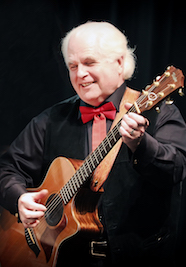Old songs bring history to life when we use them as stepping-stones: their lyrics, melodies, and sentiments help us to imagine the era when they were first popular. The songs in this series were well-known in in the United States between 1840 and the 1890s.

David connects the songs with the historical context that surrounds them. The music takes on more meaning, and history and song come to life together. The music from the 19th Century can be witty, naive, pointed, or heart-rending.
Quick Links: Listen to Songs Entire Series Song List
And the tales that surround many of the songs are stories nobody could invent...
• The failed gold miner who wrote "Jingle Bells"
• The story of the actual "Man on the Flying Trapeze"
• What "Seeing the Elephant" meant to the Forty Niners
• The gritty and surprising origins of a cherished lullaby
• The Irish ballad written by a German immigrant in Indiana
• The song that was illegal to sing or own during the Civil War
• and lots more...
Programs in past seasons have included:
• Stephen Foster - Making Music American
The first American freelance composer, and the most famous songwriter of the 19th Century, Stephen Foster died penniless in 1864 at the age of 37. David loves to tell the story of Foster's brief life, and how he sought to create a new kind of American song. His artistic journey is inspiring: he began his career writing buffoonish songs for blackface minstrel shows and went on to write songs that were deeply sympathetic to African Americans. Abolitionist Frederick Douglass referred to them as "heart songs." During the course of the concert, David sings a dozen Foster songs in the order in which he published them—from his first song in 1844 to his last in 1864. The playlist includes Open Thy Lattice, Love; Oh, Susanna; Camptown Races; Swanee River (Old Folks at Home); My Old Kentucky Home; Hard Times Come Again No More; Some Folks; Beautiful Dreamer; and others.
• On the Go - Travel in the 19th Century
Travel in the mid-19th century was not for the fait of heart. On stagecoaches, wagons, riverboats and ocean-going ships, a journey was full of danger and adventure. In this program you will hear songs the pioneers heard as they made their way west, and songs about the perilous journey.
In one whirlwind hour David sings authentic 19th Century songs about traveling by wagon, canal barge, river, train, bicycle, and stagecoach. He even includes two early Tin Pan Alley songs about automobiles and airplanes. Songs: Wait for the Wagon; Low Bridge, Everybody Down; The Boatmen Dance; The French Velocipede; The California Stage; The Great Rock Island Route; In My Merry Oldsmobile; Take Me Up With You, Dearie; and David's hilarious Oregon Place Names song, featuring the unusual names of 128 Oregon towns.
• Music on the Oregon Trail
On the Oregon Trail, you couldn't bring much with you, but you could bring songs. During the six-month trek, music was a source of strength, hope, entertainment, and consolation. For this program, history and stories of the great western migration are interwoven with music specifically mentioned in emigrants' own diaries. These are songs the pioneers actually recalled singing and hearing as they made their way west in the 1840s and '50s, including: Wait for the Wagon; Home, Sweet Home; The Girl I left Behind Me; What was Your Name in the States; Begone, Dull Care; My Old Kentucky Home; O, California; and more.
• Women Poets and Ballad Composers
In 1844, Marion Sullivan became the first American woman to write a hit song. Despite living in a time when "proper" ladies were actively discouraged from any form of public musical activity, Sullivan and other bold 19th-Century women created and published beautiful, memorable songs. This hour focusses on those female musical pioneers and their ballads, including The Blue Juniata; In the Gloaming; The original "Rock-a-Bye-Baby" song; Do They Miss Me at Home; The Old Log Hut ("Row, Row, Row Your Boat"); and other gems.
• Songs of Hardship and Hope
Some songs speak from within the experience of struggle, and others offer comfort and strength to those in need. In this concert David features a century of iconic songs of lament and yearning, including: Poor Wayfarin Stranger; Follow the Drinking Gourd; Tramp Tramp Tramp the Boys are Marching; Home, Sweet Home; Brother Can You Spare A Dime; Keep on the Sunny Side; One More River to Cross; Amazing Grace; and more.
• The California/Oregon Gold Rush 1848–1855
Between 1848 and 1855, several hundred thousand treasure seekers made their way to California and Oregon, and some wrote songs about their experience. Songs: In the days of 49; O California; Seeing the Elephant; The Miner's Lament; The Miner's farewell; What was your Name in the States; more.
• Newfangled Inventions
One hour of 19th-Century songs extolling the latest and most modern inventions! 150 years ago, before radio or phonograph, songwriters published some odd but strangely uplifting songs about the velocipede (bicycle), hot air balloons, electric lights, the telegraph, the telephone, the sewing machine, baseball, and more. The playlist includes songs like: The Base Ball Song; The New Electric Light; Song of the Sewing Machine; Take Me Up with You Dearie; The Wondrous Telephone; The Telegraph Boy; and The Daring Young Man on the Flying Trapeze. (He was a real person, and he invented something!)
• For 2023
David is presenting 60-80 minute highlights programs with his favorite songs and stories from more than 50 concerts in Oregon and California. Click here for details.
![]()